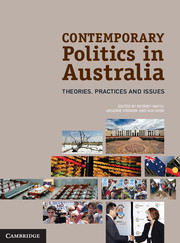Book contents
- Frontmatter
- Contents
- Tables and figures
- Contributors
- Acknowledgements
- Introduction
- I Contemporary Theories of Australian Politics
- Part II Politics in Everyday Australian Life
- Part III Elections
- Introduction to Part III
- 11 Electoral rules
- 12 Political parties as electoral players
- 13 Campaigns and campaign funding
- 14 Voter behaviour
- Part IV Participation and Representation
- Part V Inside the Australian State
- Part VI Contemporary Public Controversies
- Glossary
- References
- Index
- References
13 - Campaigns and campaign funding
from Part III - Elections
Published online by Cambridge University Press: 05 June 2012
- Frontmatter
- Contents
- Tables and figures
- Contributors
- Acknowledgements
- Introduction
- I Contemporary Theories of Australian Politics
- Part II Politics in Everyday Australian Life
- Part III Elections
- Introduction to Part III
- 11 Electoral rules
- 12 Political parties as electoral players
- 13 Campaigns and campaign funding
- 14 Voter behaviour
- Part IV Participation and Representation
- Part V Inside the Australian State
- Part VI Contemporary Public Controversies
- Glossary
- References
- Index
- References
Summary
Electoral campaigns are a fundamental part of the electoral cycle that produces Australian governments. Whether democratic theorists would see these campaigns as signs of democratic health or sickness depends a bit on the vision of democracy they hold (Chapter 1). It is important to understand and analyse the behaviour (Chapter 3) of parties when they advertise, market themselves and their candidates, and compete for media coverage. A discourse theory approach can help us to understand campaigns, as the parties compete over the production of words and images – texts – to persuade voters to identify with and support them. As Chapter 5 notes, all successful political parties have to produce a discourse of popular support. Critical theorists would question the capacity of election campaigning to reveal deep issues of power and inequality in Australia (Chapter 4).
Voters determine the outcome of an election campaign through the ballot box; however, they are campaign participants and not contestants. Likewise, interest groups that use the heightened activity of an election campaign to promote their views to voters and candidates cannot be described as contestants. Media outlets, too, are significant campaign participants. What distinguishes political parties from other organisations is that they contest campaigns with the goal of being elected.
- Type
- Chapter
- Information
- Contemporary Politics in AustraliaTheories, Practices and Issues, pp. 142 - 151Publisher: Cambridge University PressPrint publication year: 2012
References
- 1
- Cited by

